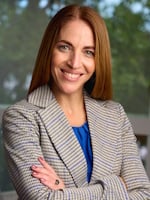Etiology, Assessment and Diagnosis of OCD
Enroll in the Online Self-Study course and complete it at your own pace.
6 CE hours available for behavioral health clinicians upon completion.
What if the client sitting across from you doesn’t “look like” they have OCD—but is suffering from it anyway? Obsessive-Compulsive Disorder is one of the most debilitating and misunderstood conditions in behavioral health. It often hides in plain sight, misdiagnosed as depression, anxiety, or personality disorder, while its sufferers spiral through shame, self-doubt, and isolation. Clinicians who miss it—or mistake it—risk delaying effective treatment by years, sometimes decades.
If you’ve ever struggled to correctly identify OCD in your clients—or to distinguish it from overlapping conditions—this course offers the clinical clarity and tools you need. Join us for a deep dive into what OCD really looks like and how to assess it with accuracy and nuance.
Register for the 6 CE Online Self-Study for
$180
Gain tools to correctly identify OCD in your clients
Payment Options are listed at checkout
Get the OCD Counseling Certificate Training Program for $499 (Save $41)
Earn 18 CEs and access all 3 training modules
Payment Options are listed at checkout
Dr. Melanie Smith, PhD, LMHC, CEDS-C, is a seasoned clinician, researcher, and trainer who brings extensive expertise to this course. With her specialization in OCD, anxiety disorders, eating disorders, and transdiagnostic emotional conditions, she provides insight that blends cutting-edge research with practical clinical application. As a Certified Eating Disorders Specialist and Consultant, and a Unified Protocol Trainer, she is deeply familiar with complex, comorbid presentations.
Dr. Smith’s teaching approach is rooted in compassion and clinical precision. She brings forward the science while addressing real-world challenges clinicians face when diagnosing OCD and related conditions. This course helps learners develop diagnostic discernment with structured assessments, case-based insights, and a trauma-informed, culturally responsive framework.
Participants will examine the heritability and neurobiology of OCD, epigenetic and environmental influences, and sociocultural factors that shape symptom expression. The course explores the complexities of differential diagnosis—such as distinguishing OCD from PTSD, eating disorders, tic disorders, and personality disorders—and outlines best practices in assessment using standardized tools like the Y-BOCS. Special attention is given to misunderstood subtypes, identity-related obsessions, and the role of trauma, perfectionism, and experiential avoidance in maintaining symptoms.

Instructor
Melanie Smith, PhD, LMHC, CEDS-C (she/her) is a therapist in private practice at CBT of Central & South Florida (https://cbtcentralflorida.com) and a Consulting Clinical Training Specialist for the Renfrew Center. She is a Licensed Mental Health Counselor and Qualified Supervisor in the State of Florida. Additionally, she is a Certified Eating Disorders Specialist and Approved Consultant (CEDS-C) and is a Certified Therapist & Trainer of the Unified Protocol for the Transdiagnostic Treatment of Emotional Disorders (UP). Special treatment interests include Avoidant Restrictive Food Intake Disorder (ARFID), Disorders of Gut-Brain Interaction such as Rumination Syndrome, OCD, phobias including emetophobia, health-related anxiety, and coping with chronic pain & chronic illness.
Dr. Smith is passionate about the dissemination and implementation of evidence-based treatments, clinical supervision, and clinical training and has presented numerous lectures, workshops, and Keynote presentations at academic and professional conferences nationally and internationally. She has co-authored publications in peer-reviewed journals and is co-author of the peer-reviewed treatment manual and patient workbook, The Renfrew Unified Treatment Model for Eating Disorders and Comorbidity, published by Oxford University Press.
Key Takeaways:
Master diagnostic distinctions: Learn how to differentiate OCD from conditions with overlapping symptomatology.
Identify overlooked presentations: Recognize non-obvious subtypes and culturally nuanced manifestations of OCD.
Use effective assessment tools: Integrate structured interviews and validated instruments into your clinical practice.
Why this course?
Expert-led education: Dr. Smith offers rare depth, weaving together research, lived clinical experience, and passion for evidence-based practice.
Clinically practical: This course prepares you to implement what you learn immediately in your intake, assessment, and treatment planning.
A mission-driven institute: Telehealth Certification Institute is dedicated to empowering clinicians with high-quality, ethically grounded, and accessible training.
Learning Objectives:
Discuss the heritability of OCD.
List at least two environmental factors that impact the development of OCD.
Identify the diagnostic criteria for OCD, including rule-outs for the condition.
Assess clients for overlapping symptom presentations and differentiate OCD from other diagnoses.
Whether you’re a seasoned clinician or expanding your scope of practice, this course will sharpen your diagnostic lens and elevate your confidence in working with clients affected by OCD.
Add this powerful tool to your professional toolkit—your clients will thank you.
This is a non-interactive, self-study course that offers over 6 hours of video instruction, a post-test, and a course evaluation.
Select each tab for course details
Availability: From the time of registration, you have six months to access the coursework.
Who Should Attend: This course is intended for clinicians who provide behavioral health services.
Teaching Methods: This is a non-interactive, self-study course. Teaching methods for this course include recorded lectures, videos, a post-test, and a course evaluation.
How to attend: Directions for completing a course can be found by clicking here.
This program was recorded on January 19, 2024.
Testimonials
Bridgette Nalumu
Public health consultant, Green and Purple Consultancy Network
Lora Verley
Clinical Therapist, Bayless Integrated Healthcare
Jackie Tanna
Therapist, Region One Mental Health
Jackie Bell-Russell
Therapeutic Behavioral Strategist, Rialto Unified School District